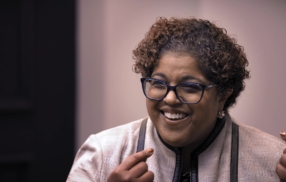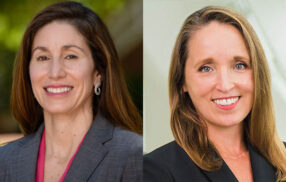Leadership Unscripted: Effective Sustainability Leaders With Chrissa Pagitsas
By Molly Mitchell
How should a leader manage the sustainability function of a business effectively? Chrissa Pagitsas (MBA ’09), founder and principal at Pagitsas Advisors and author of Chief Sustainability Officers at Work, joined University of Virginia Darden School of Business Professor Mike Lenox for a Leadership Unscripted conversation about implementing Environmental, Social and Corporate Governance (ESG) strategies, the challenges sustainability leaders often face and approaches that allow for effective change within organizations.
Before her current role, Pagitsas served as chief sustainability officer at Fannie Mae and helped raise a $50 billion green fund investment through the firm. “When I built the green mortgage business,” she said, “what it really meant was convincing owners — commercial owners who have large portfolios of these [apartment] buildings — to make choices that make their properties more energy efficient.” The built environment, or existing commercial buildings, account for a large percentage of greenhouse gas emissions.
In order to convince commercial owners to make the switch to more energy-efficient buildings, Pagitsas and her team created a mortgage that incentivizes them to consider things like energy efficient HVACs or better windows when they refinance or acquire new property, or a “green” mortgage. Mortgages back bonds, so a green bond is “a security backed by a green mortgage, backed by a green property.”
For Pagitsas, the technical structure of funding environmentally sustainable projects was only half the battle. “At the end of the day, [it was really] having this kind of conversation one-on-one with developers and owners to get them to say yes … to doing something new that they hadn’t done before.” It was usually a “no” at first, and Pagitsas discussed the importance of looking at things from the developers’ perspectives to figure out what would move the needle for them.
“A lot about sustainability integration is how you get to yes. And that’s about change management, communication and stakeholder engagement,” she said. She emphasized leading with the positive changes environmentally friendly moves can make for the individuals and businesses rather than focusing on the societal threat posed by unmitigated climate change. Within or outside of one’s company, she said that focusing on the opportunity or risk mitigation inherent in sustainability is the best way to demonstrate value and drive change forward.
Their conversation then shifted towards the broader role of leadership in innovation and sustainability. “Any innovation that requires sustainability, truthfully, does require a first mover that is willing to take a leap of faith. There are costs, there are new technologies that have yet to be proven. But somewhere along the line, early on, somebody said, you know what? I see the potential here and I’m going to lead. And I do think that that’s what it takes to move the needle forward in this space, is finding the people who are willing to take leaps of faith, willing to be brave, willing to experiment, and frankly willing to fail, but learn.”
She pointed out that, although today Fannie Mae’s portfolio has more than $100 billion issued in green bonds, the first several iterations of the product failed.
In writing her book, Pagitsas gathered the experiences of 25 chief sustainability officers and used them draw out important lessons and challenges for those looking to lead in this space. Lenox and Pagitsas some of those challenges, such as navigating complex regulations, managing competing priorities, and balancing short-term and long-term goals.
When it comes to interfacing with broader stakeholders and an increased focus culturally on social and environmental justice, Pagitsas urges companies to collaborate with critical voices. “There will be critics. How do you make the critics partners to actually get you to a better solution? I don’t think companies should be afraid of the critics. I think they should be ready to engage and ask questions and see what they can learn from it. That’s brave leadership to me.”
Listen to the interview as a podcast here:
The University of Virginia Darden School of Business prepares responsible global leaders through unparalleled transformational learning experiences. Darden’s graduate degree programs (MBA, MSBA and Ph.D.) and Executive Education & Lifelong Learning programs offered by the Darden School Foundation set the stage for a lifetime of career advancement and impact. Darden’s top-ranked faculty, renowned for teaching excellence, inspires and shapes modern business leadership worldwide through research, thought leadership and business publishing. Darden has Grounds in Charlottesville, Virginia, and the Washington, D.C., area and a global community that includes 18,000 alumni in 90 countries. Darden was established in 1955 at the University of Virginia, a top public university founded by Thomas Jefferson in 1819 in Charlottesville, Virginia.
Press Contact
Molly Mitchell
Senior Associate Director, Editorial and Media Relations
Darden School of Business
University of Virginia
MitchellM@darden.virginia.edu





